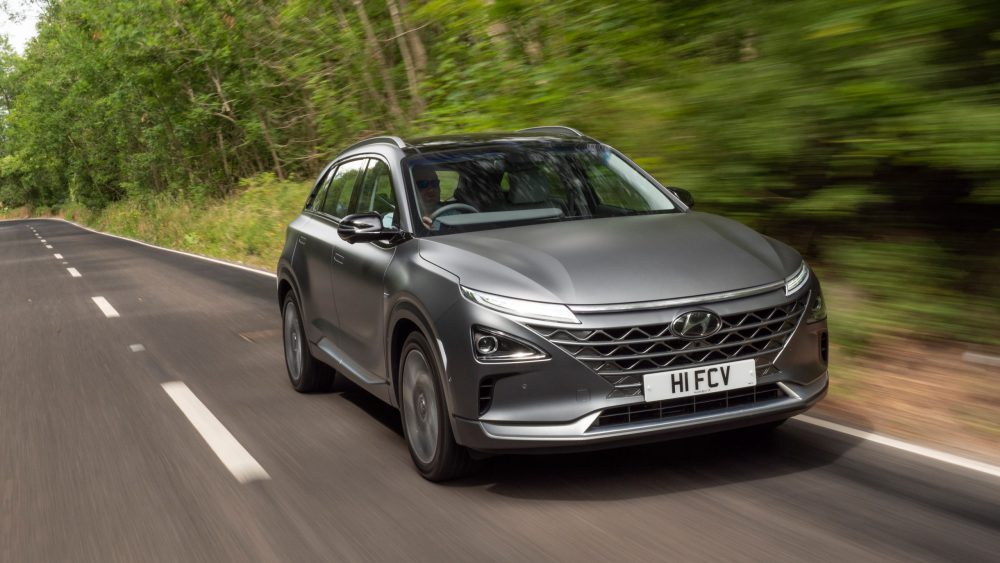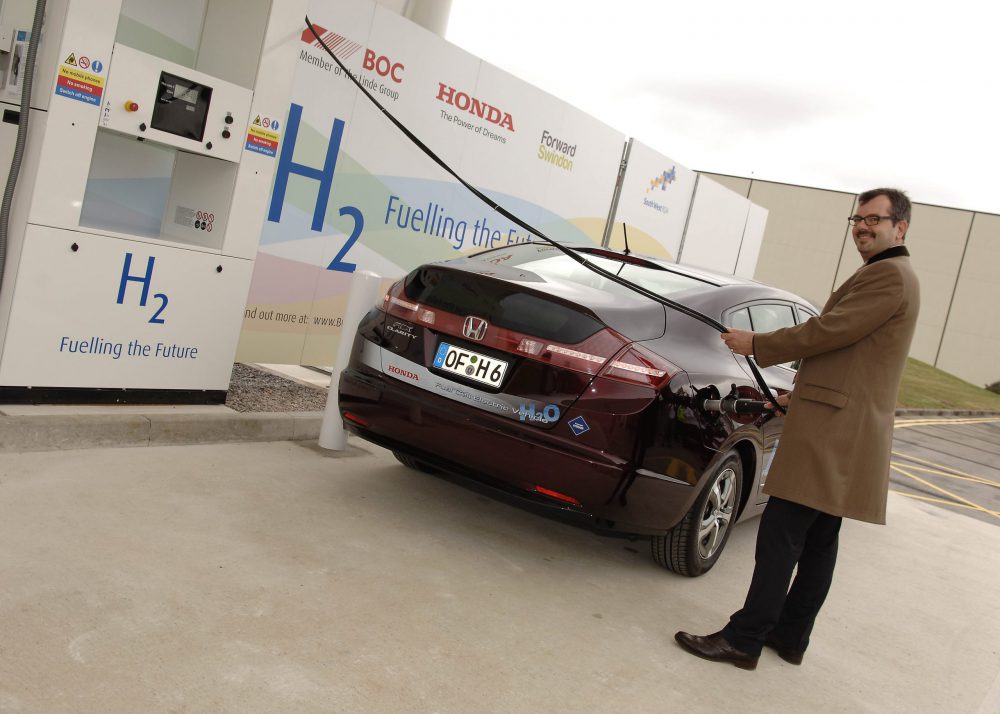
You might have heard the term hydrogen fuel cell car and wondered what it was. It’s an eco-friendly alternative fuel that’s already on sale, and which some claim represents the future of motoring. There is certainly a growing shift for car makers to develop this new tech. But how viable is it? Read on to find out all about fuel cells.
What is a fuel cell car?
Imagine a car that could generate its own electricity to power a motor from a naturally occurring element. Broadly speaking, that is what a fuel cell car is: an electric car that is fuelled by hydrogen so doesn’t need to have its batteries charged from the mains.
The fuel cell and its control unit live where you’d find the engine in a combustion engine car and under the floor. The tanks that store the flammable hydrogen are heavily reinforced and located in the middle and towards the rear of the car. Other than that, it’s a traditional looking car.
How does a fuel cell work?
The fuel cell induces a chemical reaction that splits the hydrogen molecules into positives and negatives. By mixing these with air taken from outside, they create electricity to power a motor. The by-product is water which is expelled from the car as vapour.
Where do you buy the fuel?

You refuel a fuel cell car just as you would a petrol or diesel motor. You pull into a roadside filling station and pop the fuel filler flap. Because the hydrogen is pressurised, the pump has a special nozzle that attaches to the car. Once this is done, it takes about five minutes to refill the hydrogen tank, making it significantly quicker than charging a battery electric car.
Can you buy hydrogen in the UK?
Yes you can. The hydrogen is under pressure so you must fill up at a station, rather than charging at home as with electric cars.
The trouble is, the number of hydrogen filling stations is very limited. In March 2020, there are 14 in the UK. Six of those are in and around London. There is only one in Scotland (near Edinburgh) and the next closest to that is Sheffield. There are just two hydrogen stations between Sheffield and London.
Can you buy fuel cell cars now?
The UK’s hydrogen car market is currently in a state of flux. Although up until recently you could buy models from Toyota (the Mirai) and Honda (the Clarity), the only hydrogen car currently available is the Hyundai Nexo. And at £65,995 including the UK government’s £3500 zero emissions incentive, it’s expensive. But it is a luxury motor with heated and ventilated seats, heated steering wheel and a 12.3-inch navigation screen.
How expensive is the fuel?
Hyundai claims its Nexo has a range of 414 miles, which is better than an electric car. Hydrogen is bought in kilograms rather than litres or gallons. In early 2020, hydrogen’s cost per mile in fuel works out as roughly comparable with an internal combustion engine car.
Are hydrogen cars eco-friendly?
The cars are planet friendly because the only waste product from a hydrogen fuel cell is water. And manufacturers such as Hyundai reckon their cars actually clean the air as you drive along.
But critics claim hydrogen isn’t a particularly eco-friendly fuel. This is because although there’s plenty of it around, it’s usually part of another compound (such as water). And extracting it can be tricky and expensive. But the cost of doing so is coming down all the time.
Some hydrogen filling stations produce their fuel on site. But those that don’t must have the fuel delivered. And that means a diesel-powered tanker. However, supporters will say that a huge number of electric cars are currently charged using energy generated from fossil fuels…
Are fuel cells the future?
Japanese and Korean car companies certainly think so because their countries don’t have massive fossil fuel resources so are desperate to find viable alternatives. They’re not alone. At the moment, every major motor maker is working on hydrogen fuel cell models. Resulting developments should cause the cost of fuel cell cars to fall.
And the infrastructure is likely to grow too. Fuel giant Shell currently runs a handful of the UK’s hydrogen stations so its rivals are unlikely to be far behind.
While hydrogen is unlikely to replace battery electric vehicles, it could run alongside them in the medium to long term, rather as diesel does with petrol today.
Very interesting. The main problem, as with the electric cars, is the price. Most ‘normal’ people could not afford them. Great for the planet though and hopefully for our future generations.
Would it be possible to convert a petrol /diesel vehicle to hydrogen in the future ie a camper van
What is your view on the Aluminum-Air battery being developed by Trevor Jackson ?
Diesel Powered Tanker? They should be the first to be Hydrogen powered as should diesel trains. I’ve believed this is the way forward for years. Lugging a massive battery around is not the answer.
Very interesting. Good range, much better than electric and much quicker re-fueling. I shall keep an eye on developments and hopefully lower prices.
Thank you for article .i certainly found the information interesting because all the general public seem to hear about is battery powered cars. with this concept any vehicle could use Hydrogen including HGV and light commercial vehicles and as usual new concepts are initialy expensive as were battery powered cars.
electric cars sound great until you think of winter motoring,heating the car interior ,keeping windsceen demisted,and ice free more use of lights as daylight gets shorter,All this must reduce the range of the car but look at brochures ,car reviews and adds this is never mentioned.
Also how many tests/reviews are done in rural hilly areas ,Peak district for instance.
Electric cars then do not seem so attractive
Hydrogen is the future when considering the total costs of electricity much of which is hidden
I have my doubts because hydrogen has a nasty habit of going BANG most violently. Inevitably over the course of time, seals will degrade or otherwise be damaged, resulting in leaks of highly explosive hydrogen. Read up about Airships!
is this the technology to power lorries, trains, and aircraft instead of fossil fuels ?
How safe is hydrogen relative to petrol?
NOT MUCH GOOD IF THERE SO FEW FILL POINTS I WOULD RATHER STICK TO PETROL
Most interesting article, thank you.
Is storing Hydrogen not a fire risk?
Very interesting but the Hydrogen cars are very expensive so we won’t be buying just now. A very interesting article from you – thanks
The flammability of hydrogen worries me. Look what happened to hydrogen balloon transport
Use electricity to make hydrogen then use hydrogen to make electricity to power the car. Nuts. Use hydrogen to power the car.
if it cost more to buy +dearer to run and hard to get the fuel why buy it
You should have said that excess generation from windfarms, which is expensive to store as electricity, can be converted by electrolysis into hydrogen and oxygen which is easy and cheap to store. It can also be used to power vehicles which can distribute the gas to retail points.
All in all Hydrogen Fuel Cells have to be a better future path than carrying batteries around the country.
Hydrogen fuel cell is the future. Battery electric vehicles, which are not as eco friendly as most people think when you consider the precious resources used in their manufacture and the way it is obtained, they are just a stop gap until fuel cell technology has developed.
Whatever happened to the hydrogen assisted alternative, where you filled a water bottle near the engine, the current passed through the water producing hydrogen. I think the Americans did more research into this than we did. As I mentioned earlier, it’s only an assist to diesel.